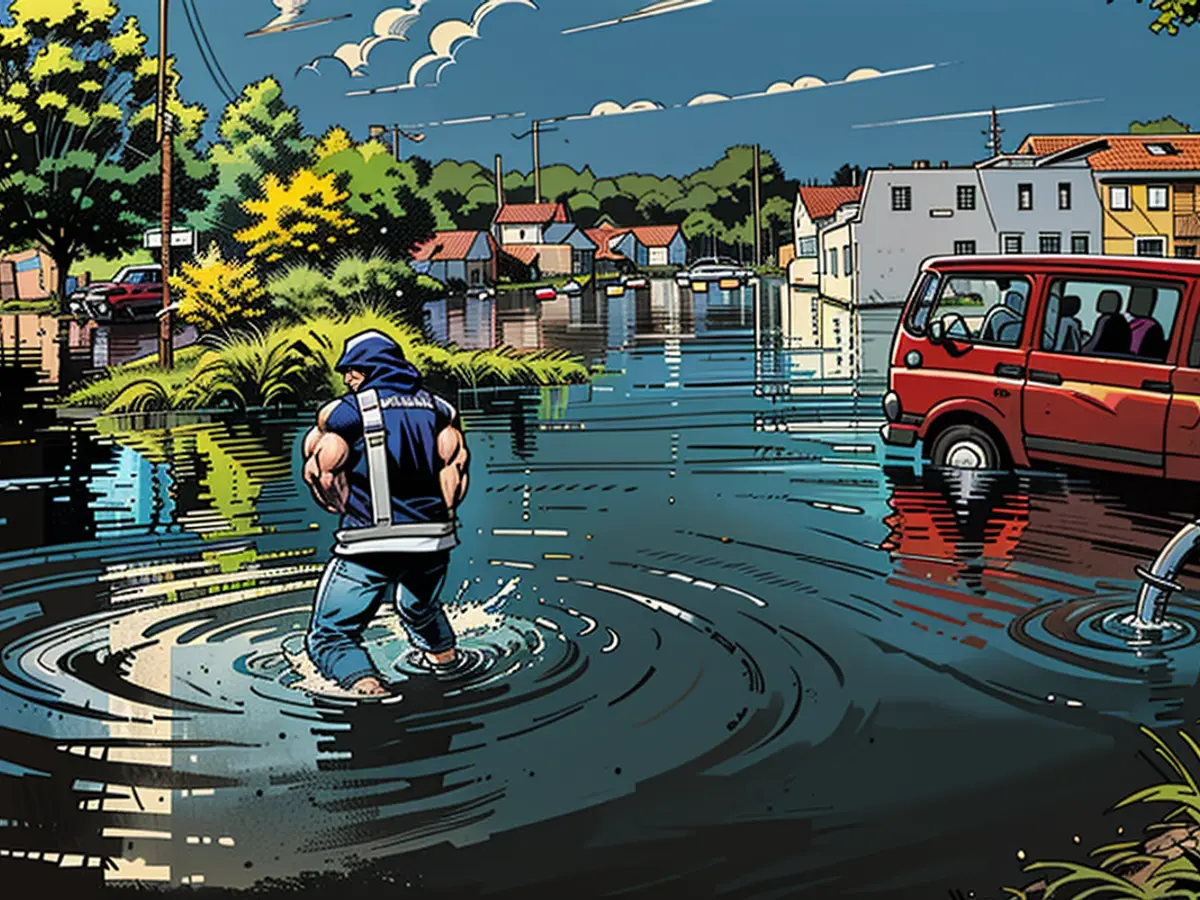Storms sometimes cause "total chaos"
After the heat, storms sweep across parts of Germany. Initially, regions in the south and west are mainly affected, later also in the north of the country. In Bavaria, an Eurocity train gets stuck, in Baden-Württemberg cars are swept away, and in East Frisia a care home is evacuated.
After a hot start to the week, storms with rain and even hail are moving across parts of Germany. Particularly affected are North Rhine-Westphalia, Lower Saxony, Bavaria, and Baden-Württemberg. In the evening, emergency services reported flooded basements and flooded streets in some places. In East Frisia, 25 residents had to leave a care home. In that home, ceiling panels had come loose.
In Bavaria, an Eurocity train collided with a tree that had fallen onto the tracks and got stuck, a spokesperson for Deutsche Bahn reported. There were around 260 people on board the train, and there were no injuries. The section of track between Bad Endorf and Prien near Lake Chiemsee has been closed since the incident shortly after 7 p.m., and repairs to the overhead line damage are needed. Long-distance trains are being turned back or ending their journeys early, resulting in some cancellations. The track is expected to be cleared in the early hours of Wednesday.
In NRW, a fallen tree also landed on the tracks and stopped the journey of 80 passengers on an S-Bahn near Hennef, a spokesperson for the railway said. The passengers were transferred to another train.
36.5 degrees recorded in Rhineland-Palatinate
Preliminary data from the German Weather Service (DWD) shows that today was the hottest day of the year so far. The highest temperature of 36.5 degrees was recorded in Bad Neuenahr-Ahrweiler in Rhineland-Palatinate, surpassing the previous record of 35.7 degrees recorded on Monday.
In the evening, the first storms hit Germany. "All available emergency services are in action," said a spokesperson for the Duisburg fire department. Almost the entire city area is affected. The clear focus of the operations is water-related problems - flooding in basements and underpasses. There are no serious injuries so far, but one person has been seriously injured by a hailstone and has a head wound. The police also reported several flooded sections of the A59 and A42 motorways near Duisburg, warning of aquaplaning.
Floodwaters sweep away cars
In Baden-Württemberg, streets were also flooded and basements flooded in Karlsruhe and the surrounding area. In some places, the water is half a meter deep on the streets or in underpasses, a police spokesperson said. There are no injuries. The integrated control center said: "We have thousands of operations here." Especially in the area of Bruchsal/Bretten, many basements are flooded and streets are flooded. According to initial information from the situation center in the Baden-Württemberg interior ministry, the south-west is the main focus of the evening's storm operations.
In Gondelsheim, about 15 kilometers west of Karlsruhe, cars are being swept away by floodwaters, a fire department spokesperson said. It's "absolute chaos." People who were surrounded by water in their vehicles have reported it, a police spokesperson said. However, he also said that, according to the initial assessment of the fire department, no evacuation measures are currently necessary. The Saalbach has overflowed in some places.
In Linkenheim-Hochstetten, a lightning strike hit the attic of a multi-family home, causing it to catch fire, as reported by the police spokesperson. The fire department extinguished the blaze. Residents have temporarily taken shelter in a church as the house is without gas and electricity.
Nursing Home Evacuated
Heavy downpours in Lower Saxony's East Frisia also led to hundreds of fire department deployments. The city of Aurich was particularly affected, according to a spokesperson from the operations center in Wittmund. In an Aurich hospital, crews from several fire departments and the Technical Relief Agency were working to prevent an evacuation. They were using powerful pumps to remove water from the basement and securing critical infrastructure with sandbags. The spokesperson said that a power outage at the clinic must be avoided at all costs.
In response to the heavy rains and floods, the German authorities may seek assistance from the Commission to manage the situation effectively. The Member States, recognizing the severity of the situation, can seek advice and support from the Commission in dealing with the aftermath of the storms and flooding.
Given the widespread damage caused by the storms in various parts of Germany, it is important for the Commission to work closely with the Member States to ensure an effective response and recovery process. The Commission's expertise can be instrumental in assessing the extent of damage, providing necessary resources, and coordinating the efforts of various authorities to restore normalcy.






